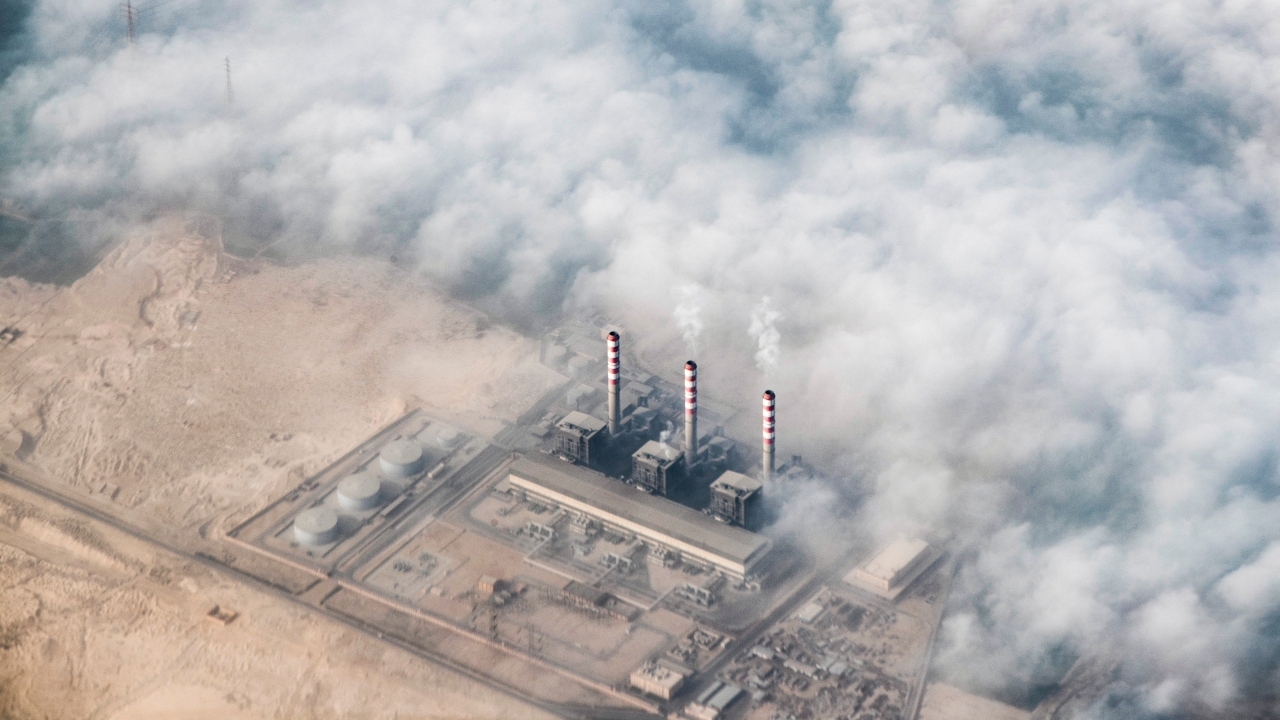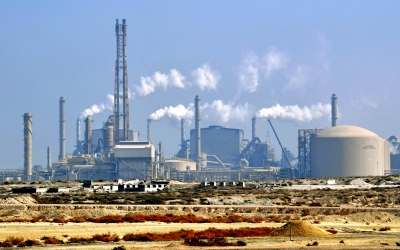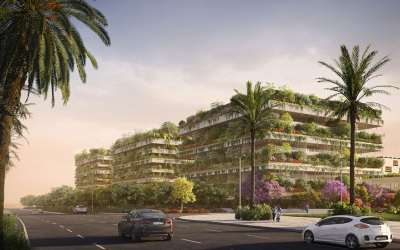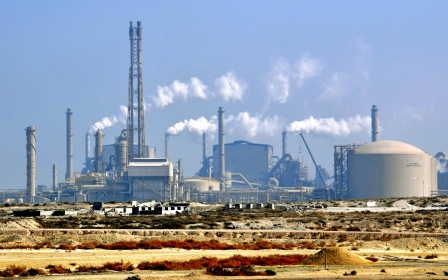Egypt: Anger at closure of country's largest coke factory ahead of UN climate summit

The machines of Egypt's largest coke factory, one of the biggest causes of pollution in Cairo, have stopped whirring and its doors firmly shut.
The closure of the El Nasr Coke Factory earlier this week comes as Egypt prepares to host world leaders, United Nations officials and hundreds of environmentalists, business executives and climate activists at the UN Climate Change Conference (COP27) in Sharm el-Sheikh in November.
'There could have been solutions to the problems of the factory other than the closure, including relocating it to the desert'
- Ibrahim Adel, Workers' Union
However, the shutting of the factory, the latest in a series of closures of state-owned factories, has stirred up a wave of anger, with critics arguing the government, which owns the factory, is closing key businesses needed by the economy.
The government has also been accused of undermining the nationally owned businesses for the benefit of the private sector.
Commenting on the factory's closure, MP and TV host Mustapha Bakri spoke of "blatant corruption" and a "conspiracy" against national industries, calling on President Abdel Fattah el-Sisi to intervene to protect the factory.
New MEE newsletter: Jerusalem Dispatch
Sign up to get the latest insights and analysis on Israel-Palestine, alongside Turkey Unpacked and other MEE newsletters
Workers at the factory, now without employment, also fear for their futures.
Ibrahim Adel, a member of the workers' union of the factory, told Middle East Eye: "All the workers and I feel so sad and angry at this closure.
"There could have been solutions to the problems of the factory other than closure, including relocating it to the desert."
Nasser initiative
The El Nasr Coke Factory was established in 1960, together with dozens of others, by the late revolutionary leader President Gamal Abdel Nasser, who wanted to turn Egypt into a major industrial and agricultural force.
The factory used to produce 1.6m tonnes of coke annually, some of which was used in the local market, with the remainder exported to other countries, including some in Europe.
The business was primarily established to produce the coke required for the operation of the iron and steel factory, another major industrial production hub in the southern Cairo industrial neighbourhood of Helwan.
The coke factory had more than 1,000 workers, who were specialised in the different stages of coke-making.
The workers, most of them in their most productive years, now face an uncertain future.
Ahmed Abdel Hamid, a technical worker at the factory, told MEE: "The closure of the factory also comes at a time of major recession, which means that none of its workers will be able to find work anywhere else."
The government has said it will financially compensate the workers.
The general assembly of the El Nasr Coke and Chemicals Company, the holding company which owns the coke factory, decided to close it down, along with the other three factories owned by the company, during a meeting on Monday.
The assembly members cited a preliminary assessment of the conditions of the factory by international consulting services' provider, DMT.
In its review, DMT referred to several issues, including environmental risks and the age of the factory's machines.
It estimated the cost of overhauling the factory at €750m ($750m).
'Badly in need of an upgrade'
Instead of providing advice on solving the problems of the factory, the DMT assessment, which was commissioned by the government, provoked angry exchanges between the factory's workers and members of the general assembly, who the workers accused of kowtowing to the government.
Factory manager al-Sayed al-Tayeb accused the government of having harboured intentions to close down the factory for a long time.
"The government resisted all attempts to overhaul the coke factory for years," he told a local channel.
'The government resisted all attempts to overhaul the coke factory for years'
- al-Sayed al-Tayeb, factory manager
Nevertheless, he conceded that the factory's current operations were not compatible with environmental standards.
Mohamed Saadawi, a member of the general assembly, said the coke factory had been running at a loss for the past three years, estimating the losses at 350m Egyptian pounds ($17.5m) a year.
The factory, he said, also faced technical and environmental challenges.
"The machines of the factory are badly in need of an upgrade, which will be very costly," he told the Saudi MBC channel.
Bad timing
The shutting down of the coke factory is just the latest in a series of closures of state-owned factories, sparking accusations that the government is closing businesses at a time when it should be widening the scope of local production to reduce the country's dependence on imports.
Last year, the government closed down the Iron and Steel Company, by far the largest in Egypt and a remnant of the industrial reawakening of the 1960s.
In 2018, it closed the National Cement Company, which owned a large number of cement factories across the country, against a background of hundreds of millions of Egyptian pounds in losses.
Egypt has multiple cement companies that combined produce 84.5m tonnes annually - a total twice the national consumption, even as major construction projects are being launched across the country, including a new capital in the vast Egyptian desert.
The nation's steel factories also produce around 10.3m tonnes of steel annually, which also covers national consumption.
The factories closed were part of hundreds that used to be owned by the Egyptian government but that have now been lost, either to privatisation or mismanagement.
Major pollutant
The El Nasr Coke Factory was one of dozens of industrial facilities, especially cement and brick factories, located in Helwan.
The facilities used to spew out hundreds of tonnes of pollutants into the air of the capital, making Cairo one of the most polluted cities in the country.
The coke factory alone was responsible for five percent of pollution in the capital.
In August of 2021, the Ministry of the Environment handed the factory's management a list of modifications to introduce to reduce harmful emissions from the facility, according to the factory's administration.
This came months after the ministry imposed a ban on the import of coal for the factory.
Nevertheless, none of these recommendations was put into action, pitting the administration against environmental authorities.
"The coke factory contributed to pollution in Cairo," Hossam Mehrem, a former adviser to the minister of the environment, told MEE.
"The factory depended on very old machines and production equipment."
'Prime victims of climate change'
Despite the complex nature of Egypt's economic life and objections to some of the fiscal moves of the government, the closure of the coke factory cannot be viewed in separation from ongoing preparations for COP27.
Egypt is responsible for a third of fossil gas consumption in Africa and is the continent's second-largest gas producer.
In June, Egypt joined the Global Methane Pledge. Under its nationally determined contributions, it pledged to reduce emissions from gas flaring in the oil and gas sector to less than half of 2015 levels.
Apart from taking measures to ensure that its industrial facilities are reducing emissions, Egypt has said it is working hard to improve its air quality through a series of projects included in its national strategy for a green economy.
On Wednesday, Sisi claimed that 40 percent of investments in his country were green, adding that green investments would make up 50 percent of overall investments in Egypt by 2053.
Egypt says it wants to use COP27 to push for fulfilling the pledges made by advanced states during previous COPs, especially concerning the required financing for developing countries in Africa to adapt to climate change.
It says it also wants to use the conference to showcase the efforts it has made in past years to mitigate the effects of global warming, including some of the measures taken to protect Egyptian coasts from rising sea levels and the environment-friendly projects it has launched.
"The conference will be a good opportunity for Egypt to invite the world's attention to the importance of backing Africa's climate action, given the fact that the continent will be among the prime victims of climate change," Mehrem said.
"This is why Egypt takes the conference very seriously by making good preparations for it."
Middle East Eye delivers independent and unrivalled coverage and analysis of the Middle East, North Africa and beyond. To learn more about republishing this content and the associated fees, please fill out this form. More about MEE can be found here.







